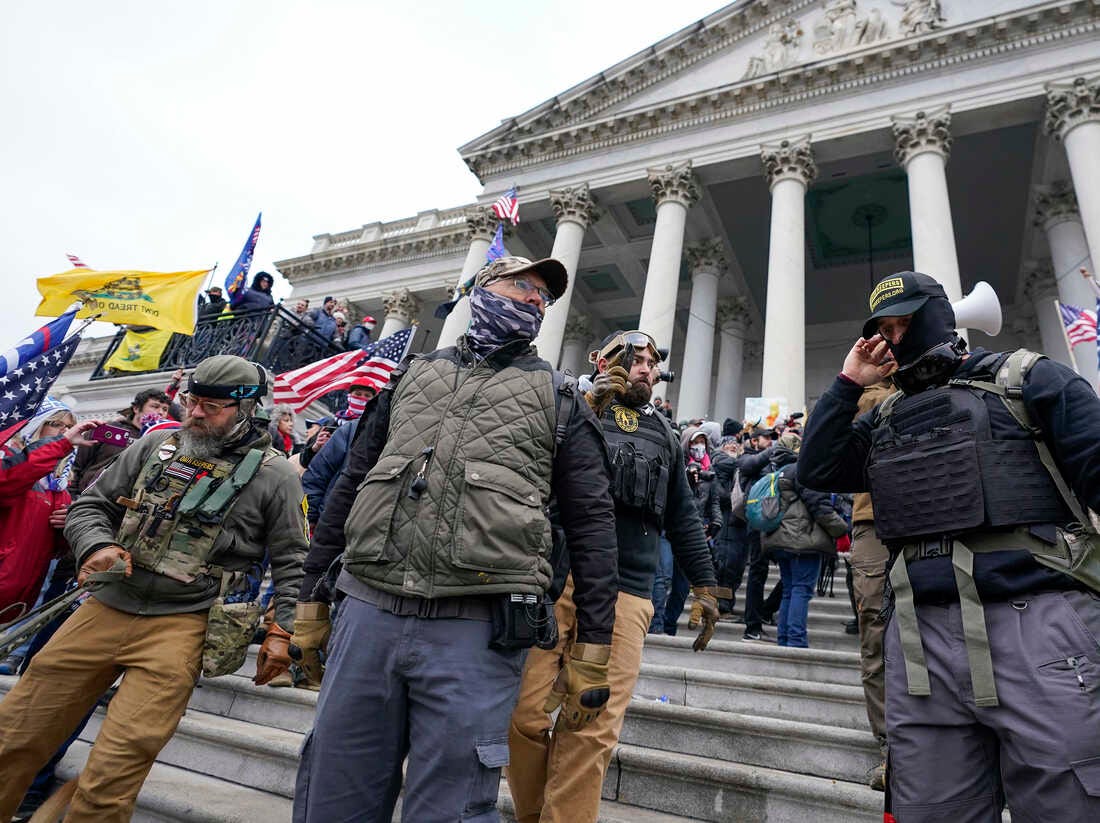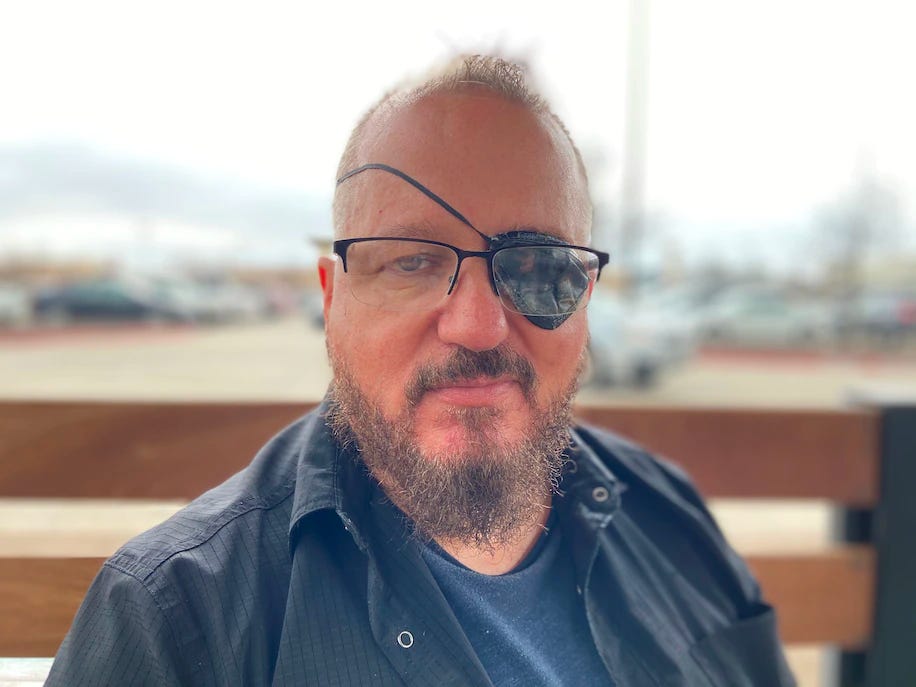Tomorrow morning, jury selection begins in the case of the leader and four members of the Oath Keepers group, indicted on seditious conspiracy and other charges. The trial itself, with opening statements, is expected to begin later in the week, and could have serious implications for Trump.

The Washington Post reports, “Prosecutors plan to call as many as 40 witnesses over a projected five-week trial, draw from 800 statements by those charged and summarize tens of thousands of messages, hundreds of hours of video footage and hundreds of phone call, location and financial records, according to pretrial proceedings.”
How We Got Here
The history of the case is interesting. It started in late January, just after the insurrection when a grand jury charged Defendants Thomas Caldwell, Jessica Watkins and Donovan Crowl, in a four-count indictment that focused on a conspiracy to prevent or delay Congress from certifying the Electoral College vote (general conspiracy under 18 U.S.C. 371) and obstructing an official proceeding (obstruction under 18 U.S.C 1512).
Over time, new defendants and charges were added to the original indictment. This process is referred to as superseding an indictment. By the time the 6th Superseding Indictment was returned in December of 2021, there were 17 defendants, charges with 7 different counts, but the lead charges continued to be conspiracy and obstruction. This group of defendants is sometimes referred to as the Caldwell defendants.
In mid-January 2022, the Caldwell matter split into three different cases. The grand jury returned the indictment in the present case, titled United States v. Rhodes, on January 12, 2022, against 11 defendants alleging eight separate violations of law over 17 counts. The lead charge was seditious conspiracy. The indictment includes other charges including conspiracy to obstruct and obstruction of the certification of the 2020 vote. The people who were charged include nine original Caldwell defendants, the leader of the Oath Keepers, Elmer Stewart Rhodes, III, and one additional member.
The remaining Caldwell defendants were named in a new indictment re-titled United States v. Crowl. One defendant, Jonathan Walden, was charged in a stand-alone case.
Three member of the Oath Keepers, Joshua James, Brian Ulrich and William Todd Wilson have since pleaded guilty to seditious conspiracy. They are expected to be among approximately a dozen witnesses who will testify for the government.
A Quick History of Seditious Conspiracy
Congress put the earliest version of the crime we call seditious conspiracy today onto the books during the Civil War. Treason was a crime that required highly specific proof that prevented its use for some conduct we might normally think of as treasonous—like an insurrection. So, approximately 100 days after the first shots were fired at Fort Sumter in April of 1861, Congress passed the act that eventually became seditious conspiracy. It used near identical language when it passed the Ku Klux Klan Act in 1871. Those provisions became the current seditious conspiracy crime, 18 U.S.C. §2384 which provides:
“If two or more persons in any State or Territory, or in any place subject to the jurisdiction of the United States, conspire to overthrow, put down, or to destroy by force the Government of the United States, or to levy war against them, or to oppose by force the authority thereof, or by force to prevent, hinder, or delay the execution of any law of the United States, or by force to seize, take, or possess any property of the United States contrary to the authority thereof, they shall each be fined under this title or imprisoned not more than twenty years, or both.”
The defendants aren’t accused of overthrowing the government, but rather with the portion of the statute that prohibits conspiring “by force to prevent, hinder, and delay the execution of any law of the United States” referencing the 12th and 20th Amendments to the Constitution. The 12th Amendment refers to the electoral college procedure for selecting a president and the 20th Amendment to the date for the new president’s term to begin. DOJ’s press release, which accompanied the superseding indictment, sets forth more factual detail about the alleged crimes and can be read here.
All Roads Lead to Rhodes
The most notorious of the defendants is their leader, Stewart Rhodes, a Yale-educated lawyer.

Rhodes will be tried along with co-defendants Kelly Meggs, a Florida auto dealership manager who is described by prosecutors as the “Florida state lead” for January 6; Kenneth Harrelson, a former Army sergeant from Titusville, Florida, who prosecutors called the “ground team lead”; Jessica Watkins, also a veteran and a former bar owner and militia organizer from Woodstock, Ohio; and Thomas Caldwell, a retired Navy intelligence officer from Virginia.
Boom!
Thankfully, there have not been many occasions in our nation’s history warranting indictments for seditious conspiracy. But the absence of a string of clear precedent complicates matters for DOJ.
The crime can be difficult to prove. In a 2010 case involving the Hutaree militia, a domestic terrorist group, a federal judge dismissed seditious conspiracy charges, rejecting the government’s charges because there was insufficient proof the group had firm plans to attack. The Judge’s problem in the Hutaree case was that the government was “too far left of boom” — meaning they didn’t let the conspiracy continue for long enough to amass sufficient proof the defendants were serious. Apparently, the judge took public safety less seriously than the sitting U.S. Attorney in Detroit did at the time the case was prosecuted. There’s an excellent assessment of the Hutaree prosecution here.
This week’s trial will be the first of three seditious conspiracy trials DOJ will conduct this fall. The trials include members of both the Oath Keepers and the Proud Boys.
DOJ will have to prove a conspiracy involving the use of force in order to convict. That’s the key to a seditious conspiracy charge, distinguishing it from a more general conspiracy or obstruction charges. Because force must be proven, there can be tension during investigations of this type of situation between getting enough evidence to convict and stopping the conspiracy before anyone is harmed. But in the case of the Oath Keepers, boom happened. So, the elements of the crime the government must prove beyond a reasonable doubt, in addition to use of force, conspiracy and sedition, seem to be almost self-evident:
Conspiracy: An agreement between two or more people, which the effort establishes through meetings in advance and concerted action here
Sedition: Attacking the Capitol to prevent Congress from certifying the results of a presidential election is practically the dictionary definition of the charge
In advance of trial, the defendants challenged the indictment on various legal grounds and asked federal district judge Amit P. Mehta to dismiss it. In June, he ruled against them:
“…the court holds that the indictment sufficiently states the offenses of seditious conspiracy, obstruction and conspiracy to obstruct an official proceeding, and conspiracy to prevent an officer from discharging official duties. It also sufficiently states offenses of tampering with documents or proceedings. Additionally, Defendants have not shown that a change in venue is warranted. Accordingly, Defendants' motions are denied.”
In other words, the prosecution could go forward, and, could go forward in the District of Columbia. The defendants wanted to move it elsewhere.
As we observe this trial, we’ll learn more about whether DOJ can advance its seeming slow progress so far into an inexorable march towards Trump’s inner circle. Will it be able to connect groups like the Oath Keepers with the Trump faithful in the Willard war rooms? Will they ultimately draw a through line from Rhodes’ little band of insurrectionists into the Oval Office?
In recent New York Times reporting, Katie Benner and Adam Goldsmith have cautioned against the view that indictments of Trump and those around him are imminent. It makes sense that DOJ would wait to develop all of the evidence that will be available to it before deciding whether to proceed and who it has evidence to indict. The proof required before charges can be filed is exacting.
That said, this case is an opportunity for DOJ to test how good its evidence and its cooperating witnesses are, and to see if it can parlay any new convictions it may get into cooperators who can help solidify cases against other targets. While Stewart Rhodes may not be able to testify directly against Trump, if he or others become cooperators, they might be able to provide the evidence necessary for DOJ to move another step up the chain. And that’s the goal, to keep rolling up the chain until you get to the most culpable people. We all know who that is here.
In most cases, people behave logically when they realize they are at risk of going to prison for a long time. They decide to cooperate to minimize their own exposure. But Trump always seems able to avoid the kind of cooperation from a close associate that would all but ensure prosecution. If one of the seditious conspiracy defendants decides to play the role of cooperator and can bring the government closer to making a case against someone in Trump’s inner circle, such as Rudy Giuliani, Mark Meadows, John Eastman, or Roger Stone, that would be a game changer.
The old adage prosecutors live by is that if you shoot at the king, you’d best not miss. The holds doubly true with Trump, where indictment would be sure to unleash a maelstrom of discontented people in his base—people who no longer honor the American compact to live by the rule of law. The only thing worse than not indicting Trump for his crimes would be indicting, but failing to convict. What happens in these next few weeks of trial has critical implications for what comes next.
We’re in this together,
Joyce




I hope they are all found guilty. I watched the coup attempt on tv as it was unfolding. I watched trump incite the offenders to action. I watched the rioters attack the Capital Police and I watched for hours while no help came. They are guilty of seditious conspiracy and should be found guilty. They should face the maximum penalty the law allows. I watched many of our elected leaders in fear for their lives while other of our elected leaders side with the conspirators. It was a disgraceful day in our history.
"Stewart Rhodes, a Yale-educated lawyer" doesn't say much for Yale.